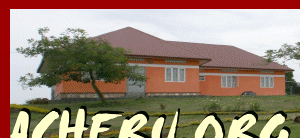| Circular - December 2023: Physiotherapy report, long term patients, and news of work in the north |
| Some staff have been at Acheru for a long time and we depend heavily on their experience. But we are a small unit, and some people, having gained experience and developed their skills, move on, perhaps to a more senior post or a bigger organization. Far from being a problem, we are very happy to see how well some former employees are doing, and how some of the skills developed while they are with us are now being used to reach much larger numbers. Staff often come to us early in their careers, and while they may lack experience they can bring fresh knowledge and techniques from their training. |
| Our physiotherapist Timothy quickly became a valued member of the Acheru 'family' and it was soon evident from his work with children and families that this is much more than just a job for him. A very common condition among children brought to Acheru is Cerebral Palsy. Over and over again we have seen dramatic results with many families completely unaware of how much could be done to unlock their child's potential, and I am really keen to see many more CP children located and referred to Acheru. |
| Timothy is central to this, working with the child and their family to show them what can be done. Last year Timothy, with some help from us, was able to attend a conference in Mombasa which he benefitted greatly from. There's another three day conference coming up; Timothy intended using his own savings to attend but in view of the potential benefits, we are once again helping. I think it will be a very sound investment. |
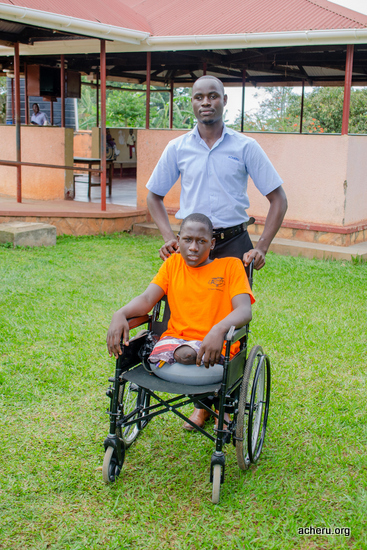
|
| The following is an extract from Timothy's recent report. |
| "Between January and October 2023 a total of 744 children with different disabilities such as Cerebral Palsy, Neurological deficits, Orthopaedic conditions and delayed developmental milestones attended physiotherapy services (1407 sessions). During that time Acheru admitted 163 new patients, with 592 previous patients also being attended to. Cerebral palsy (370 children) was the leading cause of disability. Other conditions included 181 children for neurology (injection neuritis, paraplegia, hydrocephalus, spina bifida), Orthopaedic conditions (101) including Blount's disease, osteomyelitis, club foot, and others such as Down's syndrome. |
| Numbers of physiotherapy patients are increasing. Cerebral Palsy is the leading cause of disability among children attending therapy at Acheru, however there is also a gradual increase in neurological conditions, especially injection neuritis and Erbs palsy. |
| Physiotherapy is very important in the rehabilitation of children with disability, and more emphasis needs to be placed on the follow up of children who are over 10 years of age since they are rare in the clinics. More research is needed on feasible solutions to treatment protocols and the reliable management of different conditions. There is also a need for new equipment to cope with increasing numbers of patients, and continuing medical education of the physiotherapist to advance knowledge in paediatric physiotherapy. This will boost problem solving capabilities and reduce levels of disability in children". |
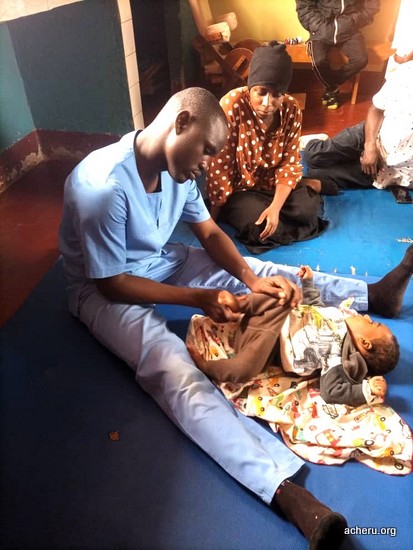
|
| Margaret Nakalema has been with us for almost 20 years now, having started as a cleaner at Besaniya when we were developing Cherub. She has 'grown' with the work and is central to much of what happens at Acheru. We first came in contact with Margaret when she was an ECM associate with training as a child evangelist. She was living in poverty and struggling to raise her five children but whatever her own difficulties she always sought to help others. At Besaniya she soon took on responsibility for looking after the guest house but also became the unofficial chaplain to the staff, often led morning prayers, and clearly had a love for children. |
| Margaret had wanted to train as a nurse. She did well in her exams and had interviews at several hospitals but, as with so many, her family couldn't afford to pay for her studies. With the development of Cherub, she was at last able to realise her dream of working with children. She is 'mother' to children and their carers, staff and visitors at Acheru and can assist with treatment. She lives in a small apartment in the inpatient unit so is always on call when help is needed. Ten years ago, a young girl called Daisy from one of the islands in Lake Victoria was admitted to Acheru. She had a number of medical needs, and it was clear treatment would be lengthy. Her fisherman father had drowned before she was born, and while being treated at Acheru Daisy's mother abandoned her and returned to the islands. |
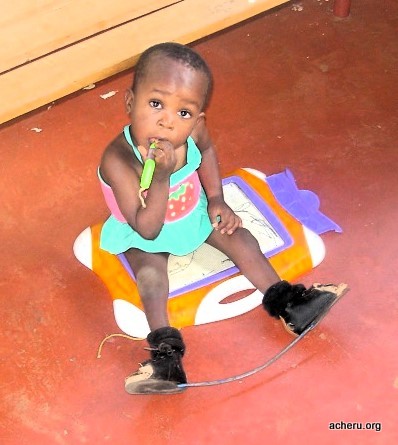
|
| Daisy, when she first came to Acheru |
| Acheru is a rehabilitation unit and it's understood that some children require lengthy stays there, but with no realistic prospect of Daisy returning home she faced an uncertain future. At this point Margaret adopted Daisy as her own daughter, and she has lived with her ever since. Daisy will require further surgery as she gets older but she is a happy child and her progress is a testament to the care Margaret has given her. Removing a child from their family is very much a last resort, and every effort is made to maintain contact with the family and community when visits are possible. Recently there have been several more children who couldn't be returned to their families. Daisy, now 11 years old, is still with Margaret but the 'family' has grown and Margaret is now fostering three more girls - Faith (10), Aisha (9), and Esther (7). |
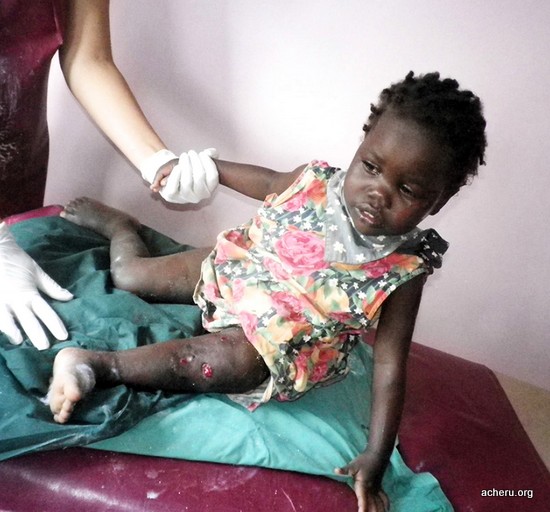
|
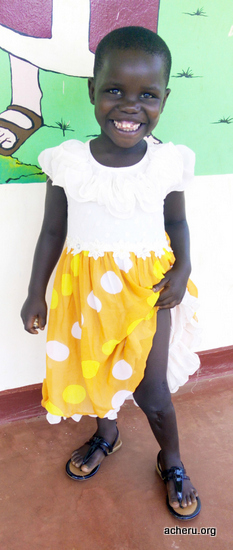
|
| Faith before and after her Acheru treatment |
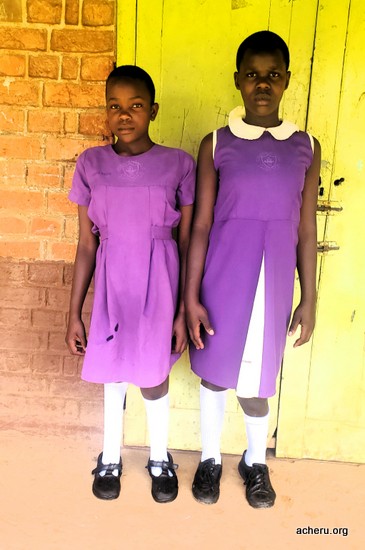
|
| Daisy and Faith at school |
| Faith, who was two years old when she came to Acheru, has been with Margaret since her mother was admitted to a psychiatric hospital, and goes to school with Daisy. Aisha and Esther are more recent arrivals. Their family came to the attention of the community team, who had already been visiting the family, when the girls' mother was beaten and badly injured by her drug addict husband and the girls were brought to Acheru while their mother had hospital treatment. |
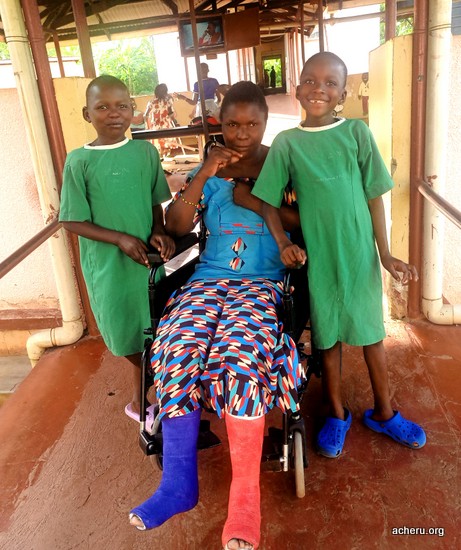
|
| Aisha and Esther with their mother after her injuries |
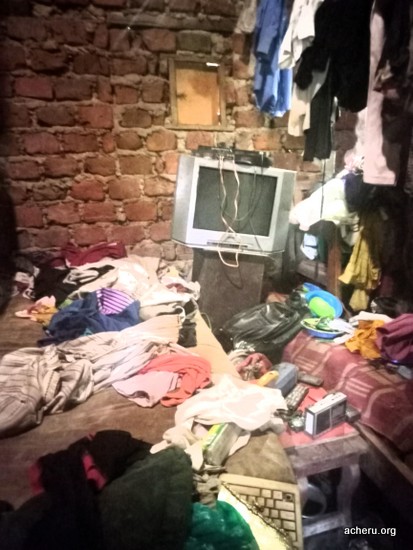
|
| Aisha and Esther's home |
| The background is so bad that the girls couldn't go back home. They appear healthy but the neglect was so bad that their development is way behind what it should be for their age. They are now cared for by Margaret and are receiving the love they never experienced before. |
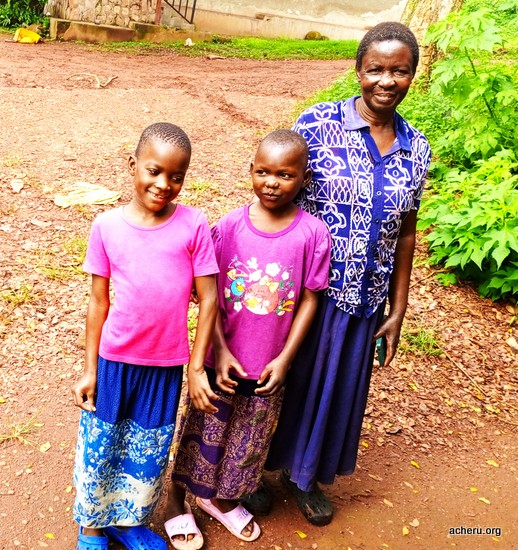
|
| Aisha and Faith with Margaret |
| Northern Uganda: |
| For many years now we've had a base at Minakulu in northern Uganda. The building was provided by the Ministry of Health and enabled us to run clinics over a wide area. We never intended our work there to be permanent, hoping that local medical staff could continue to refer children to Acheru if necessary while we could move on. While we had been open to the idea of change, a move was precipitated when the Ministry of Health wanted to take back their building. A number of locations were considered but in some cases, access was an issue. We wanted to reach remote areas but the staff needed to be able to visit without undue difficulty and transport links are needed if children are to be sent to Acheru. |
| When the Ministry of Health suggested a relocation to Napak, Joyce and Harriet visited to meet with community representatives and were surprised to find that there had never been any work like ours undertaken there - making it fertile ground for developing a community programme. Napak, 210 miles by road NE of Kampala is In Karamoja sub region, northern Uganda is district headquarters for an area of 5000 square kilometres. It is relatively sparsely populated, but numbers are increasing rapidly, probably well over 300,000. Primary school enrolment is 68%, with 4% attending secondary school. Napak town is the commercial, administrative, and municipal headquarters of Napak District. There is a history of ethnic clashes, food shortages, cattle rustling. The main language spoken is Swahili. |
| We have now handed over the Minakulu building and it was clear that many in the district were to lose the facility. We had always worked closely with local health services and other organisations who have become familiar with our work, and children can now be treated in local hospitals or, if necessary, brought to Acheru. We won't be forgetting about the area and it is Acheru's intention to go there to run clinics from time to time. At the handover government officials reported that since 2013 thousands of children with physical and mental disabilities from Oyam, Lira, Amuru, Pabo and other neighbouring districts have received orthopaedic, physiotherapy, nutritional support and other community based rehabilitation services at the centre, through referrals to the main branch at Mukono, and during outreach clinics. |
| The mayor thanked the entire team for the good services given to children of different disabilities all over the country. He was so saddened about our going considering the good work done, but he said the door is open in case there was chance to operate in Oyam, and he was willing to give us all support needed. He promised to stand with us whenever we need his help. He prayed for God to bless us wherever we will go to serve his people. |
| The District Health Officer had suggested we move to Anyike Health Centre, but the derelict building there was completely unsuitable. We then decided to hand over the Minakulu building but leave room to operate through outreaches twice a year where direct assessments and referrals can be made, working with local village and district leaders. We can review former patients who are not able to come to Mukono, and assess new patients and refer them to local hospitals and to Kabembe where reconstructive surgery can be planned. |
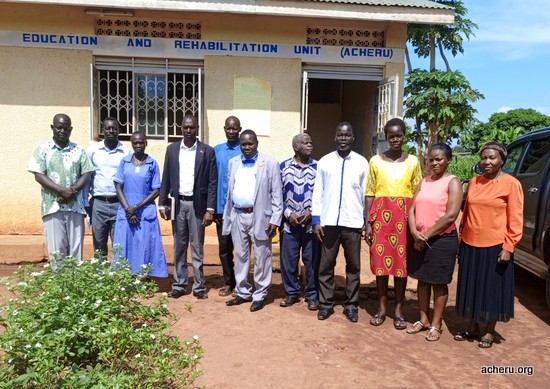
|
| The official handover, with the mayor and other officials |
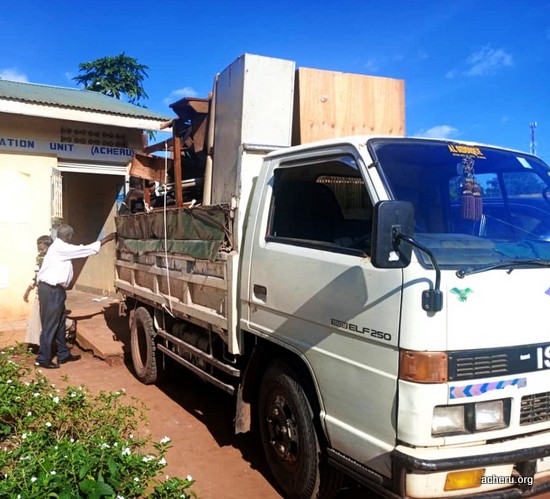
|
| Removing our equipment |
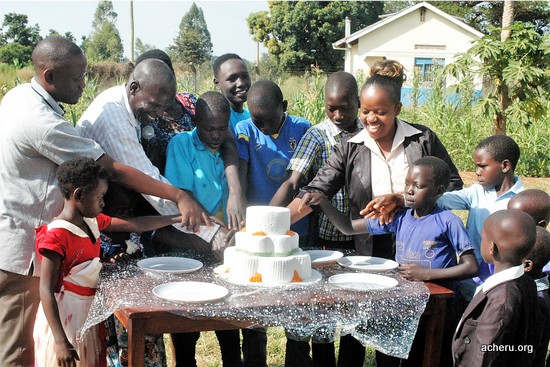
|
| A previous Minakulu Christmas party |
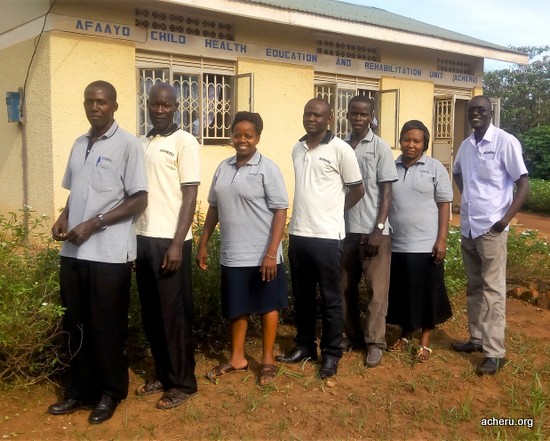
|
| Acheru staff at Minakulu |
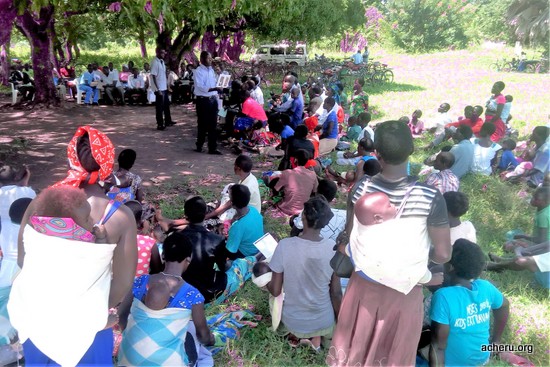
|
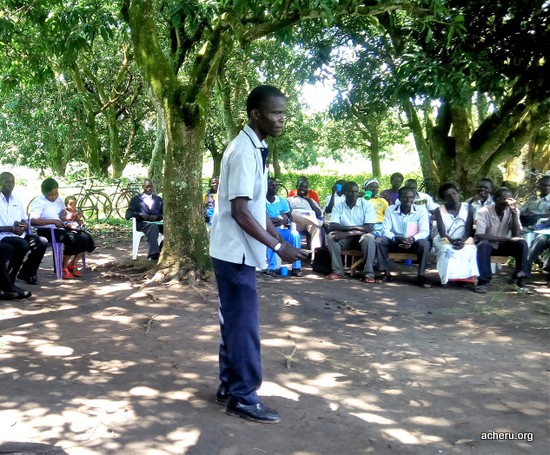
|
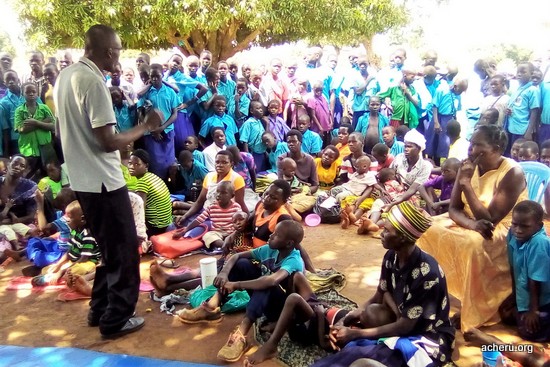
|
| Some of the community outreaches run from Minakulu |
| I spend a lot of time dealing with pictures and reports of very sick children, and I take this very seriously as we may be able to change their lives. It gives context when I'm struggling with budgets and keeps me focused on what we can change rather than feeling helpless. Thanks to your help it's been another very 'full' year for Acheru, with much blessing and the vision remaining intact. I've been reviewing all that's happened, and looking at what still needs to be done. The Acheru staff, rather than looking back and becoming complacent, are looking forward to new opportunities. |
| I've been reminded of the time of year with the estimates for the Acheru Christmas parties. These are an important part of our work and witness, bringing together former patients and their relatives, bringing gifts to needy families in the community, and helping present the work to carefully chosen guests who may be able to assist in promoting the work. |
| I don't yet know what form it will take this year, but there will then usually be an outing for all the staff to help them relax and develop their relationship as a team, setting Acheru apart from other organisations where the staff tend to work as individuals rather than as a coherent unit with complementary skills, accomplishing together what they couldn't do individually. |
| Whatever their day to day work brings, they must never forget that they are helping change lives. |
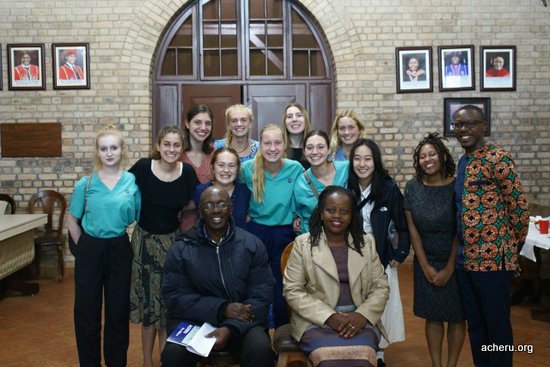
|
| Joyce with international students at Uganda Christian University. Some will do placements at Acheru, a partner since 2007, as part of their International Studies Programme |
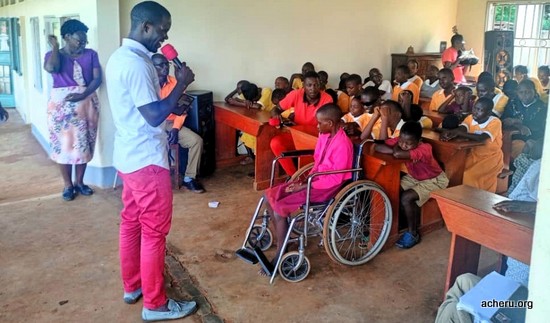
|
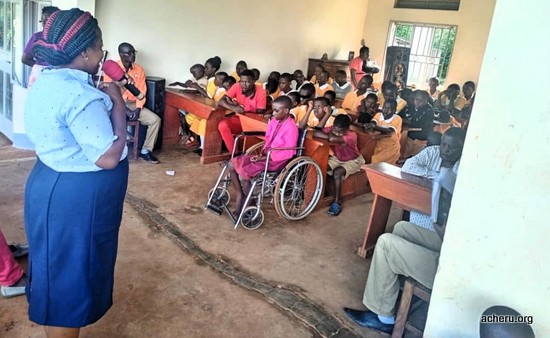
|
| Salama Outreach. Joyce and Mwaita Brian, our Acheru teacher, with blind children at Salama where we are developing a joint programme |
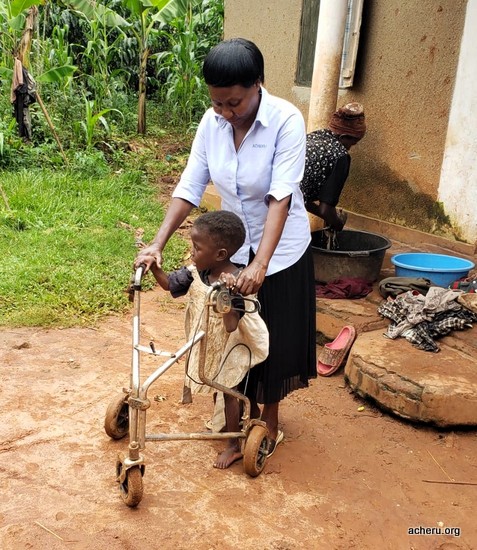
|
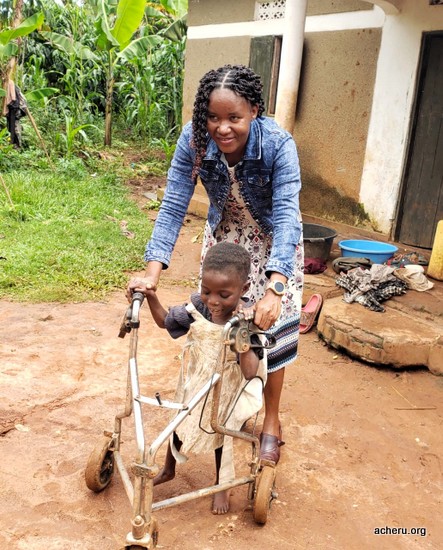
|
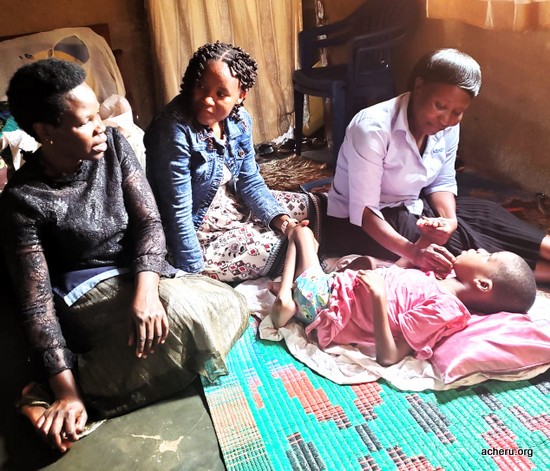
|
| Harriet and Rose on a community visit |
